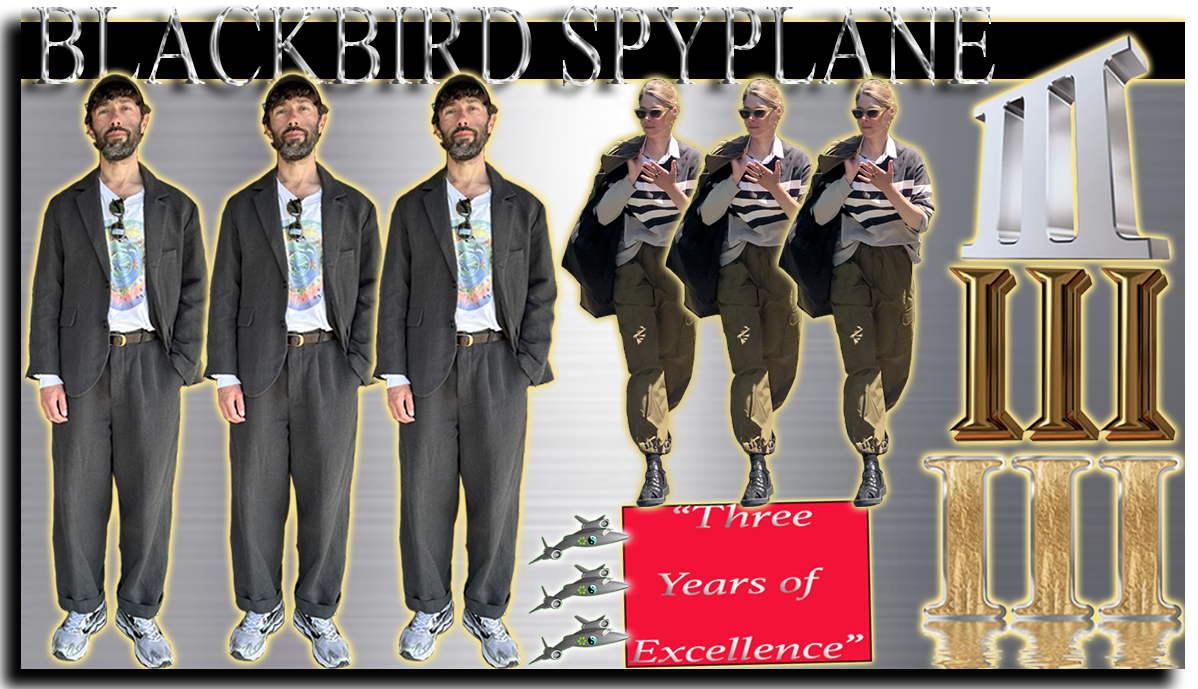Word of the week: Sletter
And other linguistic novelties from the swagged-up files of Blackbird Spyplane.
I learned about the style-and-culture publication Blackbird Spyplane—a Substack newsletter, like (but also very much unlike) the one you’re reading now—through a November 2022 article in the New York Times, which is a little embarrassing, because the publication and its creators are headquartered in Oakland, California, as am I. I should have heard about it through a local grapevine, right? Anyway, I was pulled in by the Times’s headline—”Inventing a New Language for Talking About Style”—which of course spoke directly to me and my own obsessions, and I filed it away, thinking I’d eventually write something about BBSP. (That’s a gift link to the Times article. You’re welcome.)
Then last Friday I switched on my local NPR station, KQED, and heard Forum host Alexis Madrigal interviewing the founders of Blackbird Spylane, Jonah Weiner and Erin Wylie. Alexis observed that “you guys call it a ‘sletter,’” and everyone chuckled.
And then I opened Instagram and saw a post from fashion maven Becky Malinsky. There was a photo, of course, but I went straight to the caption: “Slightly delayed bc WHAT A WEEK! But we kicked off workwear month on the sletter (stealing that term bbsp sorry!) last weekend and it continues through August.” The first comment under the caption was from BBSP itself: “Sletter is community property and we have been waiting for it to catch on !!” (Emphasis added.)
So welcome to the community. Let’s talk about sletter.

If you can truncate weblog to form blog, and magazine to create zine, why not transform newsletter into sletter? That, I assume, was the logic behind this neologism, which as far as I can tell can be credited to none other than BBSP founder Jonah Weiner. In early issues of BBSP—the publication debuted in May 2020—sletter was spelled ’sletter, with the apostrophe indicating missing letters, much as telephone was originally abbreviated as ’phone. Within a few months the apostrophe had vanished. The third-anniversary post, nostalgically titled “What Was Blackbird Spyplane?”, led off with a nod to sletter:
Blackbird Spyplane turned 3 this week! Yes — it’s wild to realize, but on the morning of May 7, 2020, this stealth-reconnaissance sletter had its turbines purring at an undisclosed “swag airfield,” dripping jet fuel onto the “digital tarmac,” cloaked in “sick titanium paneling” a.k.a. the cool clothes Erin and I (Jonah) were wearing — and about to soar.
Chopping off the heads of words—it’s officially called apheresis or initial clipping—is a common word-formation strategy in English. (Not as common as final clipping—memo from memorandum, gym from gymnasium, fax from facsimile, etc.—but popular enough.) We derive plane from airplane, bot from robot, roach from cockroach, net from internet. The rents (parents, from rental units, which came from parental units) dates back to the late 1960s, according to Green’s Dictionary of Slang. More recently we’ve seen the gram (from Instagram, which can also be final-clipped to Insta), and fit from outfit (see the “Whole fit catch a glitch” image, above).
Blackbird Spyplane’s linguistic ferment in no way ends with sletter. On KQED, Jonah described the publication’s writing style as “a lot of superlatives, a lot of all caps, a lot of slang.” A lot of boldface, too. Double question marks ?? and triple exclamation marks !!! are not uncommon. Quaintly, profanities are asterisked: not just f**k and s**t but even h*ll and d*mn. (And also Am*zon, BBSP’s version of the Evil Empire.) The tone is enthusiastic in the extreme, and—in contrast to the aloof, dictatorial tone of much style writing—cheerful and welcoming. Readers are “Spyfriends.” The word “blessed” appears frequently and, as far as I can tell, unironically. Then again, the language can skew positively baroque: the 2022 Times article cites “cerebellum-bussin quasi-paradox,” “slapping ‘plant-based’ fits,” “jawn-polytheistic spin,” and “roasted & toasted footwear.”
I admit I find much of that lingo a little daunting, but I’m pretty sure that slapping is a positive modifier. So is sick. (Wack is the opposite.) As for jawn, it’s a well-known Philadelphia-ism (Erin is from Philadelphia; Jonah’s a native New Yorker), possibly derived from joint, that serves as a context-dependent stand-in for any person, place, or thing. It dates back at least to the mid-1990s. “In the context of BBSP,” Delia Cai wrote in Vanity Fair in 2021, “it usually refers to a garment worthy of purchase.” Used in sentences (from the third-anniversary post): “Sell a Spyfriend a jawn and they’ll be swagged out when they wear it. Teach a Spyfriend how to freak jawns they already own and they’ll be swagged out for eternity.” Amen!!!
BBSP is also partial to acronyms, initialisms, and backronyms. P.P.P.H.A.T. stands for “Public Park Picnic Hikes Any Time.” (“Any day we start off in this manner is guaranteed to be a minimum of 33.3% more doper!!”) MINDSET stands for—hold on—Mad, Interesting, Naturally Developed Swag, Enthusiasm, and Taste. (I wrote about swag in 2011, but I am not 100% confident that the meaning hasn’t somehow evolved since then.)
Then there’s U.G.H.Z. (pronounced like the shoe brand), the Un-Grammable Hang Zone, a place that’s “cool and funky” and therefore unsuited to Instagram: “the kind of warm, welcoming, unpretentious place that proliferated in the ‘90s, back in the quainter, earlier days of globalization.” (Boldface sic.)
And what about the sletter’s name? The Blackbird—officially the SR-17—was an actual spy plane manufactured by Lockheed beginning in 1964. Jonah Weiner has said it was his favorite plane when he was a kid. It’s also grown-up Elon Musk’s favorite plane. Use that information however you choose.
Final clipping is more common (math, exam, doc, fax, gym)






